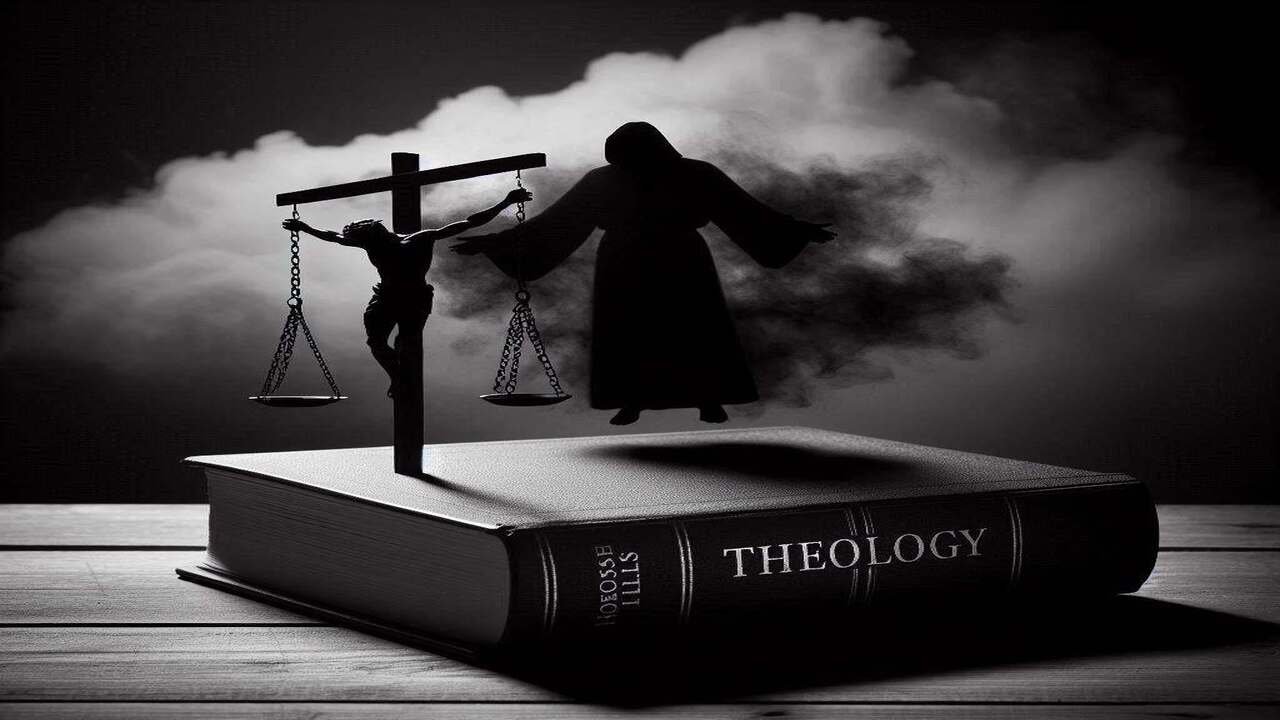The concept of sin holds a pivotal place in Christian theology, shaping the fundamental doctrines of faith, morality, and salvation. Sin is viewed as an immoral act and a transgression of divine law, severing the bond between humanity and God. The doctrine of sin, or “hamartiology,” is a crucial component of Christian theology, exploring the nature, origins, and consequences of sin.
From the Old Testament’s depiction of sin crouching at the door to the New Testament’s teachings on original sin and atonement, the study of sin is essential for comprehending the Christian worldview and the necessity of redemption through Christ.
Key Takeaways
- Sin is a core concept in Christian theology, defining the relationship between humanity and God.
- The doctrine of sin explores the nature, origins, and consequences of sinful actions and the state of the human condition.
- Understanding sin is crucial for grasping the Christian teachings on salvation, grace, and the need for atonement through Jesus Christ.
- The study of sin in the Bible, from the Old Testament to the New Testament, provides insights into the Christian perspective on morality and the human condition.
- Addressing the issue of sin is central to the Christian faith, shaping the understanding of faith, forgiveness, and the path to redemption.
Introduction to Sin in Christianity
Within the Christian tradition, sin is understood as a fundamental part of the human condition, with far-reaching implications for theology and ethics. Sin is seen as a departure from the divine standards set by God, resulting in a separation between humanity and the divine. The centrality of sin in Christian doctrine is evident in the ways it shapes concepts of sin and salvation, atonement, and the need for redemption.
The Centrality of Sin in Christian Doctrine
Christian thinkers have grappled with defining sin, often framing it as an offense against God, a violation of divine law, or a disruption of the relationship between the Creator and the created. Sin and morality are inextricably linked, as sin is understood to be a moral failure that separates individuals from God and the path of righteousness.
Defining Sin: A Departure from Divine Standards
In the Christian tradition, sin is typically defined as a willful transgression of God’s commandments or a failure to live up to the divine standards set forth in Scripture. This conception of sin emphasizes the original sin inherent in the human condition, which can only be overcome through divine grace and the redemptive work of Christ.
“For all have sinned and fall short of the glory of God.”
– Romans 3:23
The understanding of sin as a deviation from God’s intended path for humanity is central to Christian theology, shaping doctrines of salvation, redemption, and the need for spiritual transformation. As such, the concept of sin and its consequences have been a subject of deep theological reflection and debate within the Christian tradition.
Sin as Action
One of the prominent ways that sin is understood within Christian theology is as a specific action that violates God’s commandments and moral standards. Sinful actions can take many forms, ranging from willful disobedience to unintentional failures to live up to the divine expectations. The biblical depiction of sin often frames it in terms of particular behaviors that depart from the righteous path, highlighting the need for repentance and the transformation of one’s conduct to align with God’s holy ways.
Sinful Actions and God’s Commandments
The Christian doctrine of sin emphasizes that certain actions are inherently sinful because they transgress the moral laws and precepts established by God. These sinful actions can include a wide range of behaviors, from acts of commission, such as theft or adultery, to acts of omission, such as neglecting to help those in need. Fundamentally, sin as action is understood as a violation of the divine commandments that serve as the foundation for righteous living.
Intentional and Unintentional Sins
Within the Christian framework, sins can be further distinguished between those that are intentional and those that are unintentional. Intentional sins involve a willful choice to disobey God’s laws, driven by the individual’s own desires or a rebellious spirit. Unintentional sins, on the other hand, arise from human weakness, ignorance, or failure to fully live up to God’s standards, without a deliberate intent to defy the divine will. Both forms of sin, however, are seen as needing repentance and the transformation of one’s actions to restore a right relationship with God.
| Type of Sin | Definition | Example |
|---|---|---|
| Intentional Sin | A willful choice to disobey God’s laws, driven by individual desires or a rebellious spirit. | Theft, adultery, or lying motivated by selfish motives. |
| Unintentional Sin | Sins that arise from human weakness, ignorance, or failure to fully live up to God’s standards, without a deliberate intent to defy the divine will. | Failing to help someone in need, or inadvertently breaking a commandment due to lack of knowledge. |
By understanding sin as a matter of specific actions that violate God’s commandments, the Christian tradition emphasizes the importance of aligning one’s behavior with the divine standard of righteousness. This perspective underscores the need for ongoing repentance, transformation, and the cultivation of virtues that can help believers overcome both intentional and unintentional forms of sin.
“Sin is not a characteristic of human nature but a characteristic of human action.”
How does the concept of sin play a role in Christian theology?
At the heart of Christian theology lies a profound understanding of sin and its implications. The concept of sin is not merely a moral transgression; it is a fundamental aspect of the human condition that shapes the very fabric of Christian doctrine. The doctrine of justification, which explains how sinful humans can be made righteous before God, is deeply rooted in the recognition of the depths of human sinfulness.
Sin and the Doctrine of Justification
Christian thinkers have long grappled with the extent of human depravity, arguing that sin has so thoroughly corrupted the human nature that apart from God’s grace, no one can do any truly good works. This view of the human condition as inherently sinful is a crucial foundation for the Christian message of redemption and the need for divine intervention through the work of Christ.
The Depths of Human Sinfulness
The recognition of human sinfulness is central to Christian theology, as it underscores the necessity of sin and justification. Without a deep understanding of the pervasive nature of sin and theology, the Christian message of salvation would lose its urgency and relevance. By acknowledging the depths of human sinfulness, believers are better equipped to appreciate the transformative power of God’s grace and the life-changing work of Jesus Christ.
“For all have sinned and fall short of the glory of God.” – Romans 3:23
This profound statement from the Apostle Paul captures the essence of the Christian view of sin and its far-reaching implications. The recognition of universal human sinfulness is the starting point for understanding the need for sin and justification, which lies at the heart of sin and theology.
Sin as Disposition and State
In Christian theology, sin is not merely understood as a series of specific actions, but also as a deeper disposition or state of being. This view holds that sin is a pervasive inclination within the human condition, a tendency toward wrongdoing that extends beyond individual transgressions.
Sinful dispositions, such as pride, envy, and greed, are seen as vices that both arise from and contribute to the overall sinful state of the human person. These deep-seated inclinations to sin are not simply a collection of isolated acts, but rather a fundamental condition that shapes one’s thoughts, desires, and behaviors.
Sinful Dispositions and Vices
The concept of sin as a disposition or state highlights the gravity of the human predicament from a Christian perspective. Sin is not just a surface-level problem, but a deep-rooted malady that affects the very core of the human person. Sinful dispositions, such as those mentioned above, are not merely external actions, but internal tendencies that can permeate every aspect of one’s life.
This understanding of sin as a state of being has significant implications for the Christian doctrines of salvation, sanctification, and the ultimate restoration of the relationship between God and humanity. It underscores the depth of human sinfulness and the need for divine intervention and transformative grace to address the root causes of sin, not just its outward manifestations.
| Sinful Disposition | Description |
|---|---|
| Pride | An excessive sense of self-importance, leading to arrogance and a lack of humility. |
| Envy | A resentful desire for the possessions, qualities, or achievements of others. |
| Greed | An insatiable and excessive desire for material wealth or possessions. |

The recognition of sin as a disposition or state of being is a crucial aspect of Christian theology, as it shapes the understanding of the human condition and the need for divine intervention and transformative grace. By addressing the root causes of sin, the Christian faith seeks to bring about a deeper and more lasting change in the lives of believers, ultimately restoring the relationship between God and humanity.
Original Sin and Its Implications
At the heart of Christian theology lies the profound concept of original sin. This doctrine holds that the disobedience of Adam and Eve in the Garden of Eden led to the corruption of human nature, and the transmission of this sinful condition to all their descendants. The Fall of Man is seen as the source of the inherent sinfulness that afflicts the human condition, inciting individuals toward wrongdoing and separation from God.
The Fall of Man and the Doctrine of Original Sin
The story of the Fall of Man, as recounted in the Book of Genesis, is central to the Christian understanding of original sin. When Adam and Eve succumbed to the temptation of the serpent and disobeyed God’s command, they ushered in a profound change in the human experience. This act of disobedience is believed to have ruptured the original state of human perfection, introducing sin, suffering, and mortality into the world.
The doctrine of original sin holds that the consequences of this primordial transgression extend far beyond the individual actions of Adam and Eve. Rather, it is viewed as the source of the “sin nature” that all people inherit, inclining them toward selfish and unrighteous behavior from birth.
Inherited Sin Nature and Its Consequences
According to Christian theology, the inheritance of a sinful nature has far-reaching implications for the human condition. It shapes the understanding of human depravity, the need for divine grace, and the centrality of redemption through Christ’s atonement. The pervasive presence of sin is seen as the root cause of the brokenness, suffering, and alienation that characterize the human experience.
The belief in inherited sin nature underscores the Christian perspective on the universality of sin and the inability of human beings to achieve salvation through their own efforts. It highlights the vital importance of God’s intervention and the transformative power of grace, as manifested in the life, death, and resurrection of Jesus Christ.
The doctrine of original sin is a profound and multifaceted theological concept that lies at the core of Christian thought. It shapes the understanding of the human condition, the necessity of redemption, and the transformative power of divine grace. As a central tenet of the faith, the implications of original sin continue to be the subject of deep reflection and scholarly discourse within the Christian tradition.
Conclusion
The concept of sin is deeply woven into the fabric of Christian theology, serving as a fundamental tenet that shapes the faith’s core doctrines and beliefs. From the Old Testament’s exploration of sin’s origins to the New Testament’s teachings on redemption, the study of sin, or “hamartiology,” is essential for understanding the Christian worldview and the pivotal role of faith in addressing the human condition.
Whether viewed as specific actions, inherent dispositions, or an inherited state of being, sin is central to the Christian message of salvation, atonement, and the restoration of the relationship between God and humanity. By grappling with the depths of human sinfulness, Christian theology illuminates the profound need for divine grace and the transformative power of faith in Christ.
As we delve into the intricate interplay between sin and faith, we gain a deeper appreciation for the complexity of the Christian theological landscape. This understanding enables us to navigate the challenges of the human experience with greater clarity, empowering us to seek the redemption and reconciliation that lies at the heart of the Christian faith.
FAQ
How does the concept of sin play a role in Christian theology?
The concept of sin is central to Christian theology, as it shapes the fundamental doctrines of faith, morality, and salvation. Sin is viewed as an immoral act and a transgression of divine law, separating humanity from God. The study of sin, or “hamartiology,” is essential for understanding the Christian worldview and the need for redemption through Christ.
What is the significance of sin in the Christian tradition?
Within the Christian tradition, sin is understood as a fundamental part of the human condition, with far-reaching implications for theology and ethics. Sin is seen as a departure from the divine standards set by God, resulting in a separation between humanity and the divine. The centrality of sin in Christian doctrine is evident in the ways it shapes concepts of salvation, atonement, and the need for redemption.
How is sin defined in the Christian context?
One common way of understanding sin within the Christian tradition is as a specific action that violates God’s commandments and moral standards. Sinful actions can be both intentional, such as willful disobedience, and unintentional, such as failing to live up to God’s expectations.
How does the concept of sin relate to the doctrine of justification?
The concept of sin is central to Christian theology, as it shapes the understanding of salvation, justification, and the human condition. The doctrine of justification, which explains how sinful humans can be made righteous before God, is deeply rooted in the recognition of the depths of human sinfulness.
How do Christians view sin as a disposition or state of being?
Christian theology has also grappled with the concept of sin as a disposition or state of being. This view holds that sin is not merely a series of individual transgressions, but a deep-seated tendency or inclination toward wrongdoing that is part of the human condition. Sinful dispositions, such as pride, envy, and greed, are seen as vices that both arise from and contribute to the sinful state of the human person.
What is the doctrine of original sin, and how does it impact Christian theology?
A central tenet of Christian theology is the doctrine of original sin, which holds that the disobedience of Adam and Eve in the Garden of Eden resulted in the corruption of human nature and the transmission of sin to all of their descendants. The implications of original sin are far-reaching, as they shape Christian understandings of human depravity, the need for divine grace, and the importance of redemption through Christ’s atonement.








